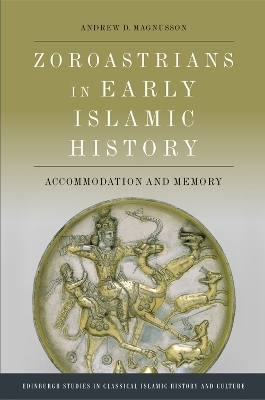
Zoroastrians in Early Islamic History
Accommodation and Memory
Seiten
2022
Edinburgh University Press (Verlag)
978-1-4744-8952-2 (ISBN)
Edinburgh University Press (Verlag)
978-1-4744-8952-2 (ISBN)
Examines debates about the inclusion or exclusion of Zoroastrians in Islamic society circa 600-1000 C.E.
Makes a significant contribution to the literature on interfaith relations in Islamic history
Demonstrates the role of advocacy in shaping early Islamic policy
Argues against the assumption that Zoroastrians were People of the Book
Engages theories of accommodation and of memory, from North America, the Middle East and Europe
Utilises archival material from Ireland, the Netherlands, the United Kingdom and the United States
The second Muslim caliph, Umar ibn al-Khattab, once reportedly exclaimed, 'I do not know how to treat Zoroastrians!' He and other Muslims encountered Zoroastrians during the conquest of Arabia but struggled to formulate a consistent policy toward the adherents of a religion that was neither biblical nor polytheistic. Some Muslims saw Zoroastrians as pagans and sought to limit interaction with them. Others found ways to incorporate them within the empire of Islamic law. Andrew D. Magnusson describes the struggle between advocates of inclusion and exclusion, the ultimate accommodation of Zoroastrians, and the reasons that Muslim historians have subsequently buried the memory of this relationship.
Makes a significant contribution to the literature on interfaith relations in Islamic history
Demonstrates the role of advocacy in shaping early Islamic policy
Argues against the assumption that Zoroastrians were People of the Book
Engages theories of accommodation and of memory, from North America, the Middle East and Europe
Utilises archival material from Ireland, the Netherlands, the United Kingdom and the United States
The second Muslim caliph, Umar ibn al-Khattab, once reportedly exclaimed, 'I do not know how to treat Zoroastrians!' He and other Muslims encountered Zoroastrians during the conquest of Arabia but struggled to formulate a consistent policy toward the adherents of a religion that was neither biblical nor polytheistic. Some Muslims saw Zoroastrians as pagans and sought to limit interaction with them. Others found ways to incorporate them within the empire of Islamic law. Andrew D. Magnusson describes the struggle between advocates of inclusion and exclusion, the ultimate accommodation of Zoroastrians, and the reasons that Muslim historians have subsequently buried the memory of this relationship.
Andrew D. Magnusson is Assistant Professor of History at the University of Central Oklahoma.
| Erscheinungsdatum | 04.11.2022 |
|---|---|
| Reihe/Serie | Edinburgh Studies in Classical Islamic History and Culture |
| Verlagsort | Edinburgh |
| Sprache | englisch |
| Maße | 156 x 234 mm |
| Themenwelt | Geisteswissenschaften ► Geschichte ► Regional- / Ländergeschichte |
| Geisteswissenschaften ► Religion / Theologie ► Islam | |
| Geisteswissenschaften ► Religion / Theologie ► Weitere Religionen | |
| ISBN-10 | 1-4744-8952-4 / 1474489524 |
| ISBN-13 | 978-1-4744-8952-2 / 9781474489522 |
| Zustand | Neuware |
| Informationen gemäß Produktsicherheitsverordnung (GPSR) | |
| Haben Sie eine Frage zum Produkt? |
Mehr entdecken
aus dem Bereich
aus dem Bereich
Erinnerungen
Buch | Softcover (2024)
Pantheon (Verlag)
CHF 22,40
Universalgelehrter, Polarreisender, Entdecker
Buch | Hardcover (2024)
mareverlag
CHF 39,20


